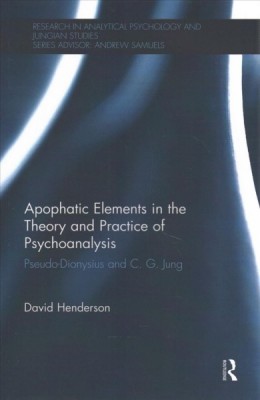| Apophatic Elements in the Theory and Practice of Psychoanalysis: Pseudo-Dionysius and C.G. Jung Contributor(s): Henderson, David (Author) |
|
 |
ISBN: 0415791758 ISBN-13: 9780415791755 Publisher: Routledge OUR PRICE: $65.50 Product Type: Paperback - Other Formats Published: December 2016 |
| Additional Information |
| BISAC Categories: - Psychology | Movements - Jungian - Religion | Christian Theology - General - Psychology | Mental Health |
| Dewey: 150.195 |
| Physical Information: 0.39" H x 6.14" W x 9.21" (0.59 lbs) 184 pages |
| Themes: - Religious Orientation - Christian |
| Descriptions, Reviews, Etc. |
| Publisher Description: How can the psychotherapist think about not knowing? Is psychoanalysis a contemplative practice? This book explores the possibility that there are resources in philosophy and theology which can help psychoanalysts and psychotherapists think more clearly about the unknown and the unknowable. The book applies the lens of apophasis to psychoanalysis, providing a detailed reading of apophasis in the work of Pseudo-Dionysius and exploring C.G. Jung's engagement with apophatic discourse. Pseudo-Dionysius brought together Greek and biblical currents of negative theology and the via negativa, and the psychology of Jung can be read as a continuation and extension of the apophatic tradition. Henderson discusses the concept of the transcendent function as an apophatic dynamic at the heart of Jung's thought, and suggests that apophasis can provide the key to understanding the family resemblance among the disparate schools of psychoanalysis. Chapters consider: -Jung's discussion of opposites, including his reception of Nicholas of Cusa's concept of the coincidence of opposites The in-depth examination of primary sources in this comprehensive volume provides a platform for research into apophasis in the wider field of psychoanalysis. It will prove valuable reading for scholars and analysts of Jungian psychology studying religion and mysticism. |